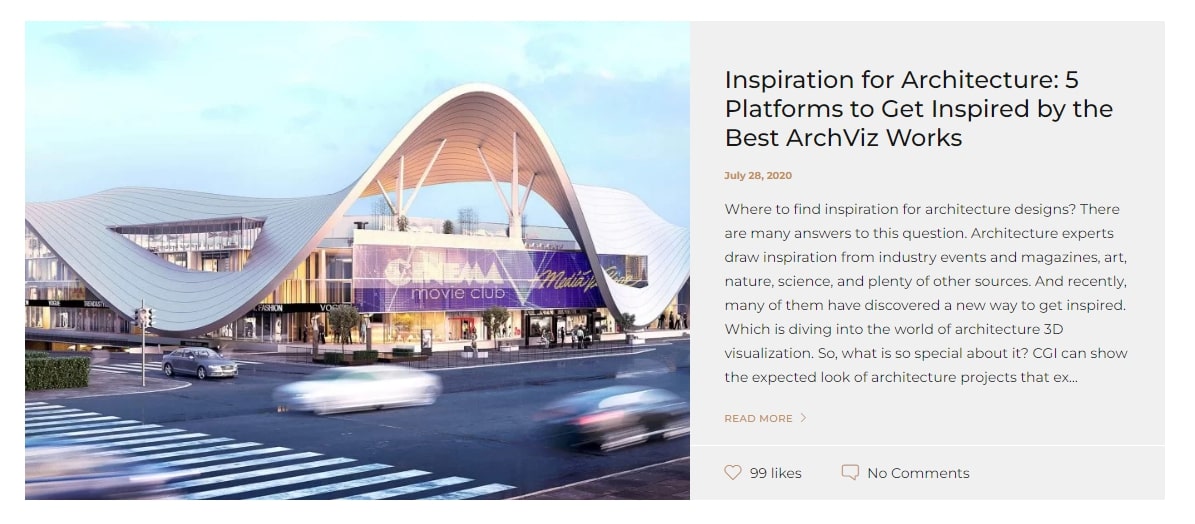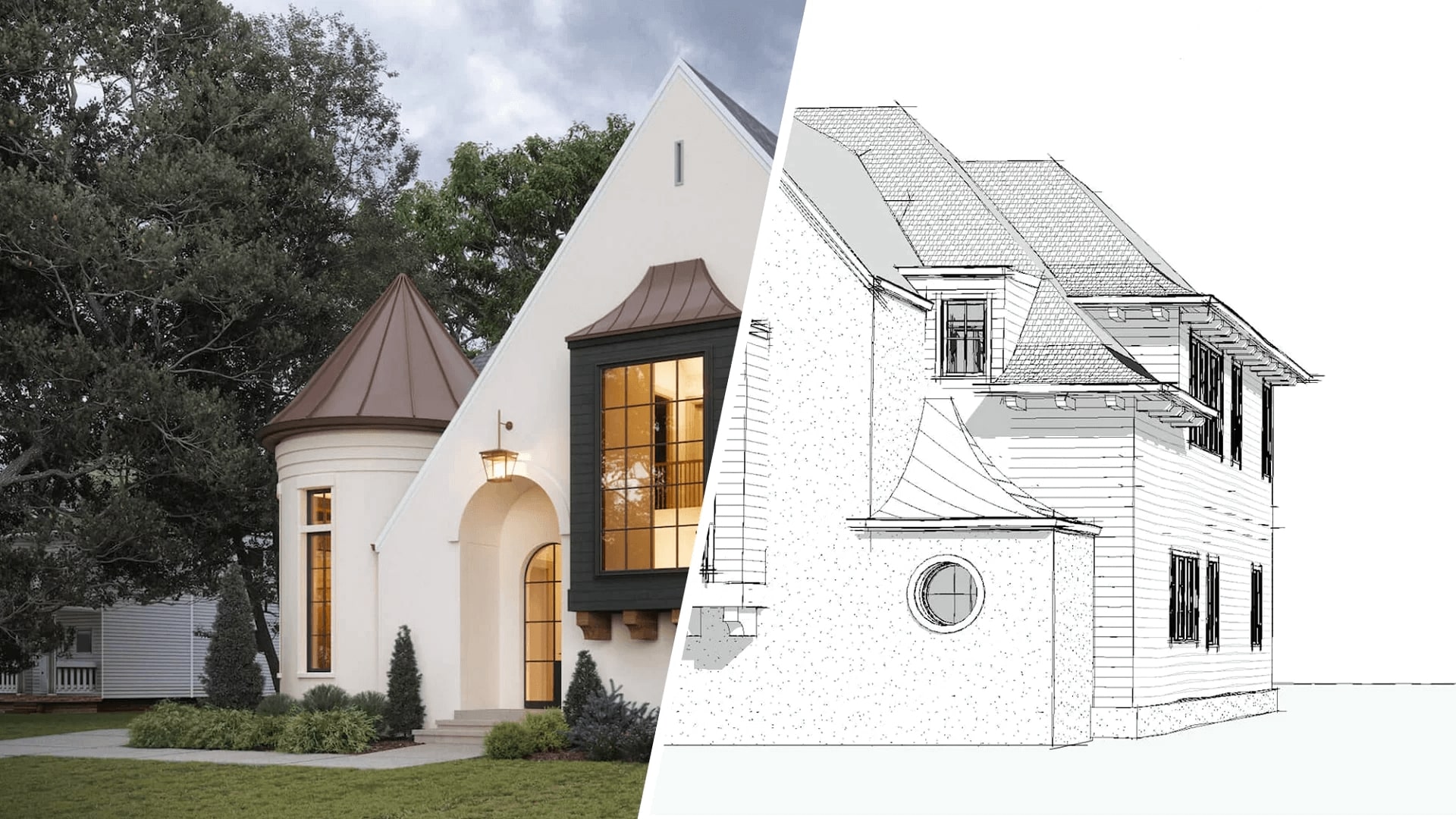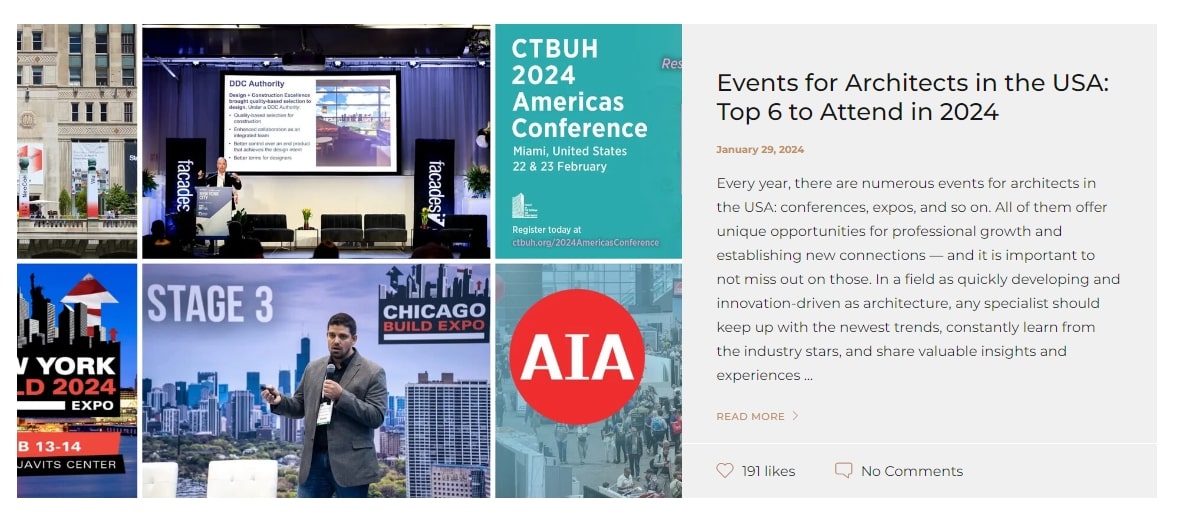Blogging is a great tool for businesses to build trust with potential clients. HubSpot found out that companies with blogs attract 55% more website visitors than those without. And it’s no wonder, as according to another research, 70% of people prefer learning about a company through articles rather than direct advertising. So, high-quality blog content has great potential to attract prospects’ attention and gain their trust. This is especially important for architects. After all, their clients entrust them with significant budgets, and even more importantly, with creating their dream homes. So, how should one use blogging for architects to win ideal clients’ trust?
Our 3D rendering studio partners with hundreds of architecture professionals. So we learned how content marketing in their niche works. Wondering how architects can use blogging to foster a strong relationship with their audience? Read on!
#1. Showcase Expertise through Educational Content

Blogging allows architects to demonstrate their expertise and educate prospects about their niche so they can have clear expectations. What topics should we cover to achieve that? Depending on your specialization, you can dive into sustainable design, residential design, commercial architecture, and more. For example, as a residential architect, you can share your experiences with custom home designs and renovations. In any case, you should keep your posts engaging and packed with insights. And don’t forget to use eye-catching visuals! 3D rendering for architects may come in handy for this one.
If you are only starting blogging, keep these practical tips in mind:
- keep a steady rhythm with your posts — don’t just start blogging and forget about it;
- stick to a content calendar that focuses on what your ideal clientele cares about;
- track your blog’s performance with tools like Google Analytics to see what works and tweak your strategy accordingly.
#2. Share Case Studies and Project Highlights

Blogging can benefit immensely from case studies that showcase your skills and successes. Your cases should include:
- project goals;
- challenges;
- solutions;
- results.
Start each case study by outlining the objectives. What were the targets and aspirations in the beginning? Were you commissioned to design a home, or maybe a commercial or institutional building? What were the requirements for it? Then, delve into the challenges, showcasing your problem-solving abilities and the solutions your team implemented. If you used some innovative materials, aligned the building with the landscape cleverly, or were able to reduce the budget – it’s all worth mentioning. Finally, discuss the results, emphasizing how they met or exceeded the project goals. How does the building look and serve its purpose in the end?
High-quality images and diagrams are essential in this aspect of blogging for architects. They visually support your narrative, making complex architectural concepts more accessible and engaging to your readers. Using 3D visualization for architecture is a great way to ensure you always have a steady stream of high-quality images even if your latest project is still under development or in the design stage.
#3. Offer Behind-the-Scenes Insights

Showing behind-the-scenes moments in blogging can humanize your brand and create a deeper connection with your audience. This type of content allows readers to see the people and processes behind your projects, making your firm more relatable and approachable.
Consider creating posts that offer a glimpse into the daily life at your firm:
- day-in-the-life posts can detail the routine of an architect, showing everything from creating conceptual drawings to making site visits;
- team interviews can provide personal insights into the motivations and inspirations of your staff;
- project walkthroughs can give a detailed look at the progression of projects from start to finish.
Such behind-the-scenes content in blogging for architects can deeply engage readers, making them feel part of the architectural process.
#4. Cover Industry News and Trends

Covering the latest architectural trends and news is a crucial part of blogging for architects. When you discuss what’s new and exciting in the architecture world, it shows that you are a knowledgeable and forward-thinking expert. This kind of blogging is perfect for positioning yourself as a thought leader in the industry.
When you write about trends, bring your perspective into the mix. This helps your readers see practical applications of new trends and keeps them coming back to your blog for insights they can’t get anywhere else.
To always keep abreast of the news, you can follow respected publications like ArchDaily, Dezeen, and Architectural Digest. Online forums and professional networks are also great spots to pick up on emerging trends and innovative ideas from around the globe.
#5. Answer Common Questions

Addressing frequently asked questions through blogging is a smart way to engage your audience. It makes your website a helpful resource and also demonstrates your attentiveness and expertise.
Consider creating FAQ-style articles that answer the most frequent questions. This format is user-friendly as it allows your readers to quickly find the exact information they’re looking for. There are also significant SEO benefits to this approach. Search engines love content that answers questions, and you’re likely to attract more search traffic through your blogging this way. People often type these exact questions into search engines, so having posts that provide clear answers can boost your rankings and visibility. The basic questions might include “How much does it cost to hire an architect?”, “What is the timeline for an architectural project?”, “How to choose an architect for my home renovation?”, “How does the architectural design process work?”, and so on.
#6. Share Testimonials and Client Stories

Sharing success stories on your architectural blog is a fantastic way to boost credibility and trust. When potential clients see the positive experiences others have had with your firm, it reinforces the sense of quality and reliability of your services. Think of testimonials as the social proof that shows your firm delivers on its promises. This is what makes them a key part of blogging for architects.
When crafting testimonials, aim to outline the initial challenge, the solution your firm provided, and how happy the client was with the outcome. Be sure to include specific details. For example, a business needed to renovate a historical building while preserving its character, and your knowledge of both the latest tech and cultural context allowed you to accomplish this. Or a family wanted to renovate while making their home cost-efficient, and your addition of green technologies and smart heating helped them to do so.
Adding photos or videos of the finished buildings brings such stories to life. Visuals enhance the narrative and authenticity of each testimonial. So don’t forget to use illustrations in your blogging. It is great to use before/afters: how the place looked initially, how it was visualized in 3D, and how it turned out in the end. People love this informative eye-catching format.
#7. Engage with Readers Through Comments and Social Media

Social media is excellent for promoting your blogging efforts. Engaging with your audience directly fosters a two-way conversation and enhances your brand’s image. By sharing links to your posts on platforms like Facebook, Instagram, LinkedIn, and X, you can reach a broader audience and drive more traffic to your website. This can also help build a loyal community around your blog.
To encourage more comments, ask open-ended questions in your posts or prompt readers to share their experiences related to the topic. Using a friendly and professional tone in responses will help maintain a positive online community atmosphere.
Showcase your architectural project like a true work of art, brought to life with cutting-edge AI-powered CGI technology.
Making the most out of the listed strategies in blogging for architects can transform a blog from a simple information-sharing platform to an interactive community hub. If done right, blogging can deepen connections with your audience, strengthen your firm’s online presence, and ultimately help you attract new clients.
Looking for 3D rendering services to ensure you always have stellar visuals to illustrate your posts? Contact us at ArchiCGI and get high-quality renderings and animation to bring your blogging and other marketing efforts to new heights!

Stacey Mur
Content Writer, Copywriter
Stacey is a content writer and a CG artist. Outside of work, Stacey enjoys musicals, Star Wars, and art talk. A proud Corgi parent.



